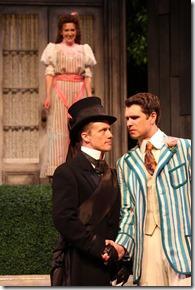
The Importance
of Being Earnest
Written by Oscar Wilde
Directed by William Brown
American Players Theatre, Spring Green, WI (map)
thru Sept 27 | tickets: $36-$44 | more info
Check for half-price tickets
Read review
A brilliant take-down of society’s enduring ills
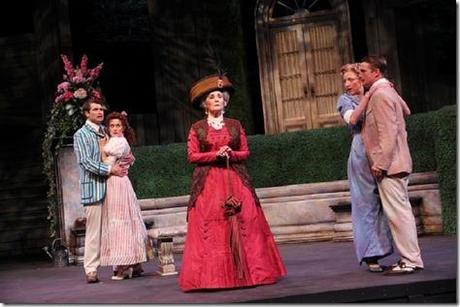
American Players Theatre presents
The Importance of Being Earnest
Review by Catey Sullivan
The Importance of Being Earnest is Oscar Wilde at his sparklingly wittiest. But it would be a colossal error to categorize Earnest as a pithy quipfest. There’s subversion and wisdom in every last one of the play’s many razor-edged epigrams. What sounds on its surface like an amiable madcap comedy is no less than a brilliant take-down of society’s enduring ills. In this piercing satire disguised as a drawing room comedy, Wilde uses words like gleaming stilettos as he inflicts a thousand and more needling puncture wounds to the smug hypocrisies and preening vanities of the upper classes. The comedy is brilliant, no doubt. But its satirical underpinnings give a mighty foundation of substance to Earnest’s glittering style.
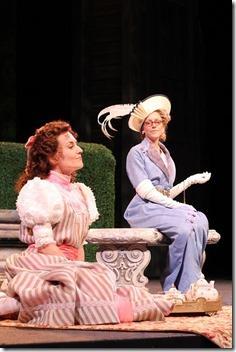
Algernon, who is the kind of mischief maker who can thoroughly undo one in the course of a weekend, also delivers an initially baffling treatise on the fine art of “Bunburying.” It’s an art that’s essential to Wilde’s goofy/profoundly lucid plot. Bunbury is his invaluable imaginary invalid friend, Algy explains. When Algernon wants to escape the city and raise havoc in the country, he simply claims he has to tend to ailing chum, and heads off under a cloud of perceived selflessness and loyalty. As it turns out, Jack has been Bunburying about as well, leaving his home in the country under the pretense of tending to his mortally malingering and thoroughly non-existent brother Earnest in the city.
But Jack has encountered complications with his double life. He is in love with one Gwendolen Fairfax (Christina Panfilio), daughter of the redoubtable Lady Bracknell (Sarah Day). He may have to kill Earnest, Jack frets. Such is the absolute seriousness of his intentions toward the fair Gwendolen. Indeed, Jack has come to the city with the express intent of proposing. Through Algernon, we get Wilde’s wry, witheringly accurate take on the dubious connection between romance and marriage:
“I really don’t see anything romantic in proposing. It is very romantic to be in love. But there is nothing romantic about a definite proposal. Why, one may be accepted. One usually is, I believe. Then the excitement is all over. The very essence of romance is uncertainty.”
Wilde has far more than that to say about Victorian-era conventions of courtship. Scratch the ”Victorian.” The Importance of Being Earnest could be set today. With the entrance of Lady Bracknell, we get a character who is simultaneously apoplectically hilarious and a vast trove of insight into the vanities and hypocrisies of the era’s moral codes. gender roles, and class systems. But while Earnest is set specifically in the late 19th century, Wilde’s text spans into timelessness. As for Lady Bracknell, she is the formidable personification of Wilde’s deliciously barbed expose of all that is wrong with the world. In this great ship’s prow of a woman, Wilde gifts us with a character that foreshadows everyone from Maggie Thatcher to Kris Jenner. “I do not approve of anything that tampers with natural ignorance,” she proclaims with an authority that calls to mind many a contemporary attitude on the likes of vaccinations or evolution or climate change or science in general, “Ignorance is like a delicate, exotic fruit; touch it and the bloom is gone. The whole theory of modern education is radically unsound.” Boom. It could be a campaign speech by Michelle Bachmann.
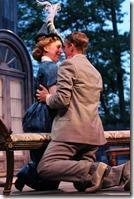
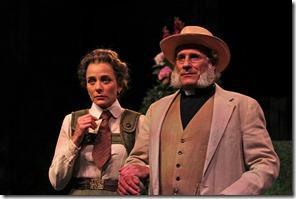
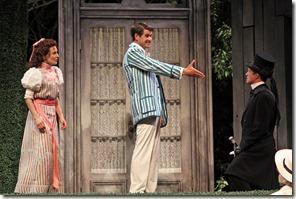
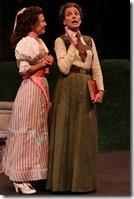
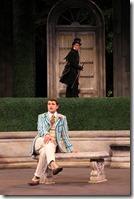
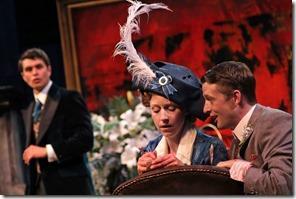
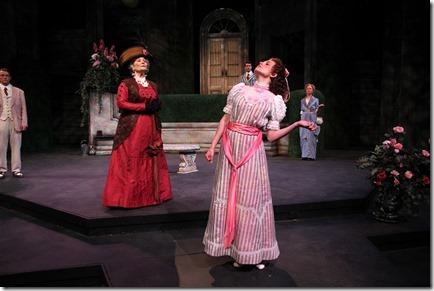
Lady B’s subsequent interrogation of Jack after learning his intentions toward her daughter is a classic refutation of snobbery, materialism and superficiality. Among other issues, Jack is an orphan, making him wholly unsuitable in Lady Bracknell’s unwavering estimation. (“To lose one parent may be regarded as a misfortune…to lose both seems like carelessness.”)
It takes a formidable actor to fill Lady Bracknell’s shoes, and that American Players has in Ms. Day. Algy and Jack may get more stage time, but Lady Bracknell is running this show. Day is as close to perfect as you’re going to get this side of the grave. It’s all too easy to play Lady B. strictly for laughs, to turn her into a one-note gorgon or a comically overblown drag queen. She’s a larger-than-life woman, but if you simply balloon her into a draconian buffoon, Wilde’s barbed social commentary gets buried. Cartoon replaces character. Day is nobody’s cartoon. She delivers Lady Bracknell with dimension and depth. She’s a fearsome, domineering presence to be sure, but Day cuts deeper than mere presence. Lady Bracknell is a force of nature, but she’s also a fully fledged person. Crafting a character that is both is a formidable task. Day gets it done gloriously.
As is his wont, Brown generates nuanced, memorable and thoroughly entertaining performances from the entire ensemble. Truschinski rather seems born to play the shallow yet quick-witted bon vivant that is Algernon, deftly capturing that always-a-tad-weary tone of the young, privileged, intelligent and underachieving. He makes the dialog sound as if he were making it up on the spot, whether he’s philosophizing about the nature of truth (“The truth is rarely pure and never simple.”) or his own personal failings (“If I am occasionally a little over dressed, I make up for it by being always immensely over educated.”) As Jack, Schwader is less glib and more overtly emotional than his smooth-operator friend. His swoony ardor for Gwendolen is delightful, his sputtering rage at Algernon’s designs on his young ward Cecily hilariously indignant.
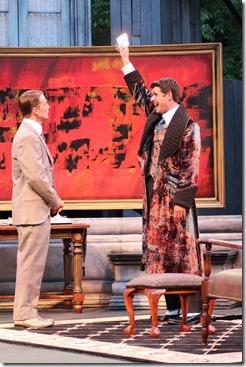
Brown’s supporting players, who play crucial and unexpected roles in ensuring that everything ends happily (“The good ended happily, and the bad unhappily. That is what fiction means.”) are striking. Tracey Michelle Arnold brings a studious vulnerability to Cecily’s tutor Miss Prisom. John Prybil is a shyly earnest clergyman as The Rev. Chausible. And as Algernon’s butler Lane, Paul Bentzen drolly personifies the very British concept of a stiff upper lip.
Mathew J. LeFebvre’s meticulously detailed costumes enhance and define the characters: Lady Bracknell is decked out in intimidating hats and shades of royal purple while the daughter’s flowing gown and aggressive feathers speak to her future transformation into the mother. Algernon and Jack are perfect dandies, right down to their gleaming cufflinks. And Miss Prism’s German heritage is humorously reflected in her no-nonsense color palette and faux Lederhausen.
The sole jarring note in The Importance of Being Earnest comes from the massive, screaming red abstract painting adorning Algernon’s parlor. It looks like a leftover from the set of Red, and Brown makes a point of having Algy’s visitors stare at it. Darned if I could figure out why it was there. That’s a quibble though, or a reflection of my own lack of perception. The Importance of Being Earnest will have you laughing until you weep, and then confounded with awe at the singular, subversive genius of Oscar Wilde.
Rating: ★★★½
The Importance of Being Earnest continues through September 27th at American Players’ Up-The-Hill Theatre, 5950 Golf Course Road, Spring Green, WI (map). Tickets are $36-$44, and are available by phone (608-588-2361) or online through their website (check for half-price tickets at Goldstar.com). More info at AmericanPlayers.org. (Running time: 2 hours 55 minutes, includes 2 intermissions)
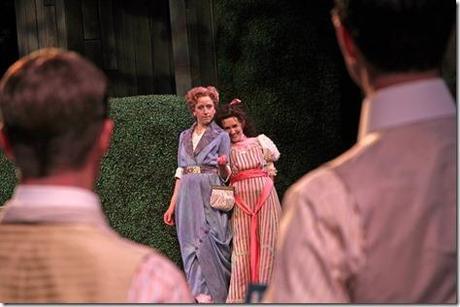
Photos by Carissa Dixon
artists
cast
Marcus Truschinski (Algernon Moncrieff), Matt Schwader (Jack Worthington), Paul Bentzen (Lane), Sarah Day (Lady Bracknell), Gwendolen Fairfax (Christine Panfilio), Tracy Michelle Arnold (Miss Prism), Kelsey Brennan (Cecily Cardew), John Pribyl (The Rev. Canon Chausible), Paul Bentzen (Merriman).
behind the scenes
William Brown (director), Sara Becker (text and voice coach), Mathew J. LeFebvre (costume design), Kevin Depinet (scenic design), Michael A. Peterson (lighting design), Andrew Hansen (sound design and original music), Erin Albrecht (stage manager), Carissa Dixon (photos)
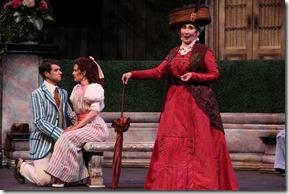
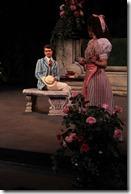
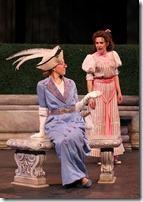
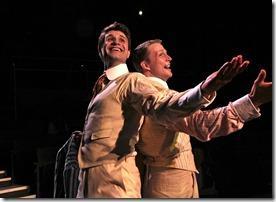
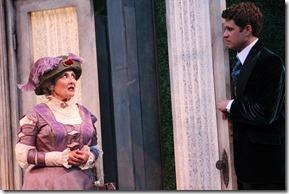
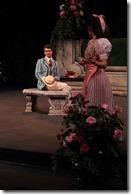
14-06w1

